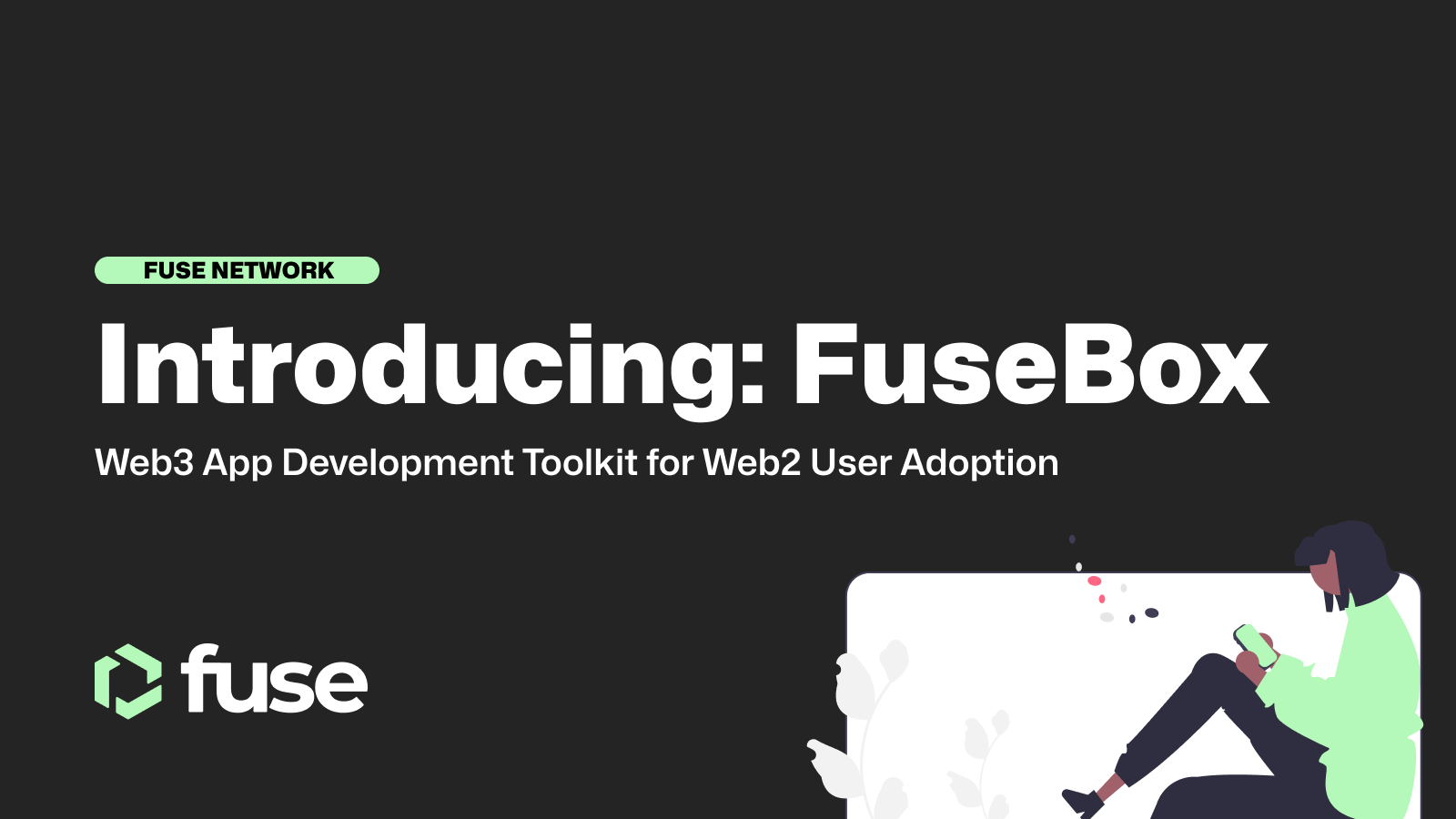FuseBox is a comprehensive development framework designed for developers who want to create applications on the Fuse blockchain without being burdened with the complexities associated with onboarding users into Web3 applications.
Incorporating Account Abstraction as a general standard within the Ethereum Ecosystem represents a pivotal advancement, heralding the seamless integration of the next billion users into the Web3 paradigm.
We have extended this innovative standard to the Fuse blockchain, a platform renowned for compatibility with the Ethereum Virtual Machine (EVM). This compatibility ensures that users can access the rich array of Ethereum’s features within the Fuse blockchain.
What you need to know
FuseBox is a comprehensive development framework designed for developers who want to create applications on the Fuse blockchain. It provides a set of APIs that cater to various functionalities:
- Smart Wallet v2 API: This API enables the creation and administration of smart wallet accounts built on the ERC4337 Account Abstraction standard.
- Notification API: Subscribing to the Notification API allows you to receive updates on wallet events and activities about your customers.
- Trade API: This API facilitates trading activities and provides access to trading-related data.
Remove onboarding hurdles with FuseBox
Distinguished by its superior transactions output per second (TPS), the Fuse ecosystem boasts an accelerated block time, thereby expediting the validation of transactions. Moreover, integrating Account Abstraction into the Fuse blockchain heralds a transformative era for Web3 app developers.
They can now embark on their projects without being burdened with the complexities associated with onboarding traditional Web2 users. When confronted with the steep learning curve imposed by non-custodial wallets that necessitate remembering private keys and mnemonic seed phrases, these users often face significant hurdles. As a result, app usage drop-off rates are high, and retention is a challenge.
As part of the FuseBox offer, Fuse has unveiled the revolutionary Fuse Connect Wallet to facilitate a more seamless user onboarding process.
Fuse Connect
Web3Auth powers the Fuse Connect Wallet and enables developers to build a simple onboarding experience for their users with extra functionalities of integrating Social Authentication and, by default, Social Recovery. Users can create Smart Contract Accounts deployed on the Fuse Network powered by Account Abstraction by clicking one button.
There are options to onboard users with their email address and a wallet service such as MetaMask, WalletConnect, or Coinbase. Use a social authentication service like Google, Facebook, Twitter, Discord, Twitch, or Github. There is also a third option for users to use their Email Address. This feature is available in the Console, a proprietary tool for Staking and Bridging on the Fuse Blockchain.
Fuse Connect offers a steadfast assurance of enhancing Web3 app performance on the Fuse blockchain by significantly lowering the obstacles developers face, aiming to attract users from both Web2 and Web3.
Fuse Connect will be made available to Developers as a component of the Fuse Box SDK. Developers can access a ready-made wallet via the Flutter SDK or the API endpoints. They will not have to bother creating a custom wallet for onboarding users. The Fuse Connect will provide an out-of-the-box experience where a simple method call will deploy a Smart Contract Account for a user.
The FuseBox component is pivotal in simplifying this process and handling the intricate tasks. Mark Smargon, CEO of Fuse Network, emphasized the significance of these new tools, stating, “With the introduction of the FuseBox and Fuse Connect, we aim to make Web3 development accessible to businesses of all sizes.“
FuseBox: Enabling Operators
Despite the potential of Web3, significant challenges persist when it comes to educating users. Arguably, users should be able to understand Web3 and participate in the new digital economy without reading encyclopedias.
Fuse understands this and, as outlined in our Whitepaper, believes that while the concept of individuals being their own banks and directly interacting with blockchain networks holds appeal, for most users, this model may need to be more practical and desirable in the long run.
Instead, we envision a future where most consumers interface with blockchain infrastructure through intermediaries, known as “Operators.” Operators can include integrators, payment providers, financial institutions, apps, consumer clubs, sharing economies, startups, local communities, online and offline retailers, and more.
They use the Fuse Network blockchain and other tools to power payment services for their customers, enabling the exchange of real-world goods and services using the blockchain.
A key feature of Operators is that they pay network fees on behalf of users. Like in traditional finance, financial service companies use a distribution platform or infrastructure to hide costs from end-users—for instance, Venmo or Square Cash cover transaction fees for using legacy systems.
Fuse embraces a similar concept. With fee abstraction, the user signs the transaction with their private key while the financial Operator relays it and pays the fee behind the scenes. Fee abstraction is a compelling approach that can help Operators find the business models of the future. Establishing a healthy community of Operators that can share tools and business insights is vital to the Fuse vision.
In Summary
FuseBox and Account Abstraction represent a monumental leap forward for the crypto industry. By unifying Contract Accounts and EOAs while eliminating unnecessary logic, this transformative concept enhances the programmability of user accounts and unlocks new possibilities for innovation.
With improved transaction efficiency, a seamless user experience, and expanded use cases, Account Abstraction on Fuse can drive mainstream adoption of cryptocurrencies and revolutionize how we interact with digital assets.
.svg)
.svg)











